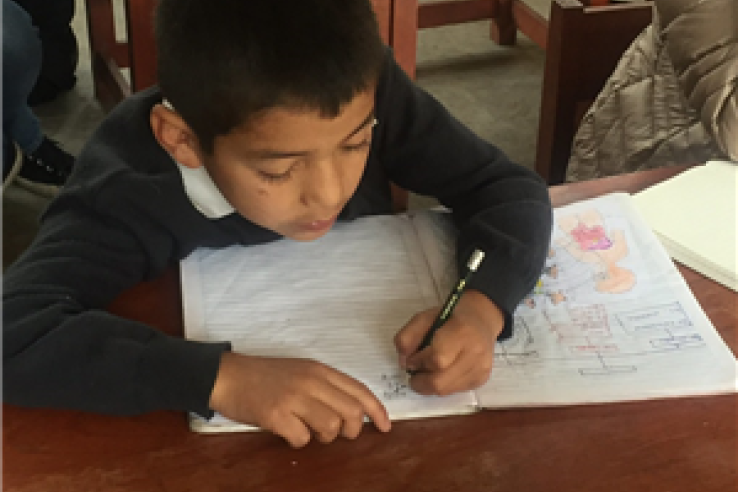July 2025 LAC Quarterly Newsletter

The Evidence Effect: Latin America and the Caribbean
The Evidence Effect is a new J-PAL resource on the future of global development that spotlights proven approaches to reducing poverty. Drawing on over two decades of rigorous research and practical experience, the content underscores how evidence can help guide smarter policy investments, especially in times of limited resources.
For Latin America and the Caribbean, there are valuable lessons in areas central to the region’s development: early childhood stimulation to support long-term growth, cash transfers to enhance well-being, information campaigns to promote school enrollment, and microcredit to foster entrepreneurship. These are but a few examples that show that even in the face of fiscal and political constraints, informed policy choices can lead to meaningful progress.
In a blog post written for the campaign, J-PAL LAC Executive Director Paula Pedro and J-PAL SEA Executive Director Lina Marliani reflect on how governments in Latin America and the Caribbean and Southeast Asia are using evidence to navigate complex challenges and strengthen the design of public policies. Read the blog post and learn more about The Evidence Effect »
Cristine Pinto joins as J-PAL LAC co-scientific Director
We are pleased to welcome Cristine Pinto (J-PAL affiliated professor, Insper) as J-PAL LAC’s new co-scientific Director, alongside Jeanne Lafortune (J-PAL affiliated professor, Pontificia Universidad Catolica de Chile). A longtime J-PAL LAC collaborator, Cristine is an economics professor at Insper and has played a key role in advancing J-PAL's presence in Brazil. She also serves as scientific advisor for J-PAL LAC’s Pathways to Preschool project. We look forward to this new chapter together.
Lessons from government partnerships
J-PAL LAC has concluded a new blog series that shares lessons from over fifteen years of collaboration with more than twenty government agencies across the region. The series highlights how these partnerships have helped expand the use of data and evidence to improve public policy—from reducing gender-based violence to strengthening decision-making in Guatemala. Read the first post and learn more »
New podcast series on public education, evidence, and policy
J-PAL LAC and the Brazilian ed-tech Letrus have partnered to launch Diálogos que Transformam, a new podcast series highlighting innovative efforts to strengthen education in Brazil with an emphasis on existing evidence. Each episode features conversations with public officials, educators, and experts, who share concrete strategies and lessons for advancing learning for all students—and J-PAL grounded in evidence and focused on impact. New episodes are out every Wednesday. Watch the first episode (in Portuguese) »
Partnering with UNICEF
On June 9, 2025, UNICEF and J-PAL LAC—through its host university UC Chile—signed a regional Memorandum of Understanding to strengthen research, training, evaluation, knowledge exchange, and evidence use for child welfare across Latin America and the Caribbean. The partnership will harness the expertise of UNICEF and several UC Chile centers—including J-PAL LAC, CLEAR-LAC, and the UC Center for Public Policy—to drive evidence-based public policy for children. It will focus on advancing research on effective interventions, strengthening national monitoring and evaluation systems, and fostering academic collaboration and public engagement. The agreement represents a strategic step toward building a more integrated ecosystem that links research, policy, and practice to improve outcomes for children and adolescents in the region. Learn more »
EVIDENCE IN LAC
Do conditional cash transfers improve early childhood development?
A study by Tania Barham (J-PAL affiliated professor, University of Colorado Boulder), Oscar M. Díaz-Botía (Paris School of Economics), Karen Macours (J-PAL affiliated professor, Paris School of Economics), John A. Maluccio (Middlebury College), and Julieta Vera Rueda (Paris School of Economics) explores whether conditional cash transfers (CCTs) have lasting effects across generations. The team assessed if CCTs impacted the early childhood development outcomes for beneficiaries' children. Despite modest gains in maternal schooling, they found no improvements in children's cognitive or physical development—or in related parenting behaviors. Read the study »
How do credit card terms affect default in Mexico?
A nationwide randomized evaluation by Sara G. Castellanos (Banco de México), Diego Jiménez Hernández (Federal Reserve Bank of Chicago), Aprajit Mahajan (J-PAL affiliated professor, University of California, Berkeley), Eduardo Alcaraz Prous (Instituto Mexicano del Seguro Social), and Enrique Seira (J-PAL affiliated professor, University of Notre Dame) tested how changes in contract terms and unemployment shocks from mass layoffs affect default among new credit card users. The results indicated that while contract term changes and job loss have similar per-peso effects on default, job loss has substantially larger effects on default because its impact on total cash flow is much greater than that of contract term changes. Read the working paper »
MEDIA HIGHLIGHTS
Educação infantil com qualidade: O papel da formação dos professores
Nexo Políticas Públicas
Caged: Apesar da desaceleração no ritmo de criação de empregos, mercado de trabalho mantém a força
O Globo
Morning call e abertura de mercado
CNN Money
Licencias médicas: No es solo un buen doctor
La Segunda